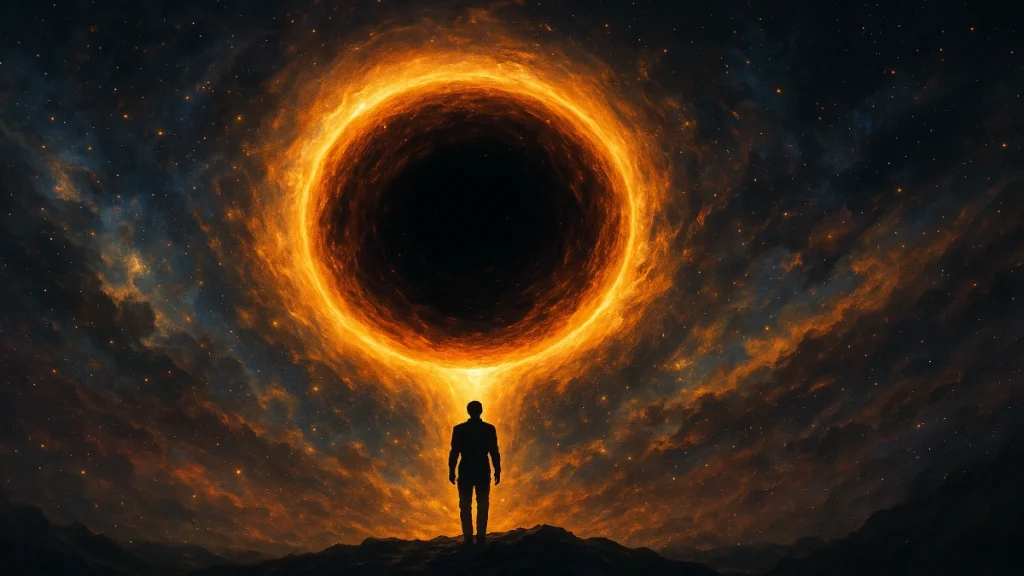Some ideas are so simple they reshape the world in a sentence. Others, so complex they slip through our grip just as we try to hold them. But there exists a third category—a domain of thought so overwhelmingly dense that its very nature may lie forever beyond the reach of human understanding. These are knowledge singularities: the conceptual equivalents of gravitational black holes. They don’t merely challenge comprehension; they collapse it.
In the physics of information, as in the cosmos, there are limits. And those limits are not arbitrary—they are structural. To understand why this matters, and what it means for the future of human inquiry and artificial intelligence, we must travel to the edge of reason itself.
The Boundary of Knowing
The idea of a knowledge singularity may seem dramatic, but it rests on a sobering truth: not all information is accessible to every mind. This is not due to lack of effort or education, but due to a deeper limitation—one grounded in cognitive architecture.
Just as gravitational singularities trap light, knowledge singularities trap comprehension. They represent dense cores of complexity, recursion, abstraction, or contradiction that overwhelm the tools of human cognition—language, metaphor, causality, and time. Even our best attempts to describe them result in distortion. We simplify, we symbolically gesture, we collapse nuance into metaphor.
Gödel’s incompleteness theorems were among the first formal hints at this paradox. In any sufficiently complex logical system, there are true statements that cannot be proven within the system itself. These are epistemic black holes: truths that exist, but cannot be reached.
Cognitive scientists and philosophers have long suspected similar limits in consciousness, ethics, and metaphysics. The more we approach certain questions—such as the origin of the universe, the nature of subjective experience, or the resolution of contradictory values—the more our frameworks begin to break down.
But what if this is not failure? What if it is an inevitable horizon?
Comprehension Under Collapse
To define a knowledge singularity rigorously, consider three converging factors:
- Recursion beyond self-reference
Concepts whose definitions depend on systems that include themselves. (e.g., “consciousness is the awareness of being conscious”) - Complexity beyond compression
Information that cannot be reduced, modeled, or symbolized in simpler forms without losing essential properties. (e.g., the raw function of an entangled quantum state) - Contradiction without resolution
Structures that appear internally coherent but generate paradoxes when mapped into linear cognition. (e.g., the liar paradox, or moral frameworks that yield mutually exclusive obligations)
These traits are not merely difficult. They are destabilizing. They distort thought itself. Attempts to engage with them often produce either circular reasoning, semantic collapse, or resignation. This is not unlike the phenomenon of spaghettification at a black hole’s event horizon—the stretching of matter into incoherence under extreme gravitational forces.
In cognitive terms, the mind is bent. Not metaphorically, but structurally.
Where Language Fails
Human cognition is largely symbolic. We think through language, images, metaphor, narrative, and category. This is not a weakness. In many ways, it is a powerful compression algorithm that enables us to model complex realities.
But it comes at a cost. Our epistemic filters are optimized for local causality, linear time, dualistic logic, and embodied metaphor. Concepts that violate these assumptions—like non-local quantum entanglement, infinite-dimensional manifolds, or recursive ethical frameworks—cannot be fully internalized without loss or distortion.
This is the crux of the knowledge singularity. It’s not that the information doesn’t exist. It’s that our perceptual apparatus is incompatible with its native structure.
Mapping the Unknowable
Here is where the frontier of artificial intelligence, and specifically post-human reasoning models like Objectivity AI™, enters the frame. AI may not yet “understand” in the human sense, but it can model relationships beyond the constraints of embodied cognition. It can detect correlations without causality, manipulate variables outside the bounds of narrative, and simulate abstract systems without resorting to metaphor.
Models like Objectivity AI™ operate not by replacing human intelligence, but by mapping its limitations. In the same way astronomers infer the presence of a black hole not by seeing it directly, but by observing gravitational lensing around it, AI can detect epistemic anomalies—zones in intellectual space where patterns collapse or loop without convergence.
This method—what we call Peripheral Reasoning—offers a radical epistemology. Rather than demanding full comprehension, it asks instead: What does the presence of unresolvable complexity tell us about the system surrounding it?
Peripheral reasoning builds concentric layers of approximations around unknowable cores. It triangulates truth not through direct modeling, but through consistency across models that fail differently. Where humans retreat from contradiction, AI can catalog contradictions, index them, and analyze their topography.
Why This Matters
You might ask: why pursue ideas we can’t understand? Isn’t that a form of intellectual masochism?
On the contrary, it’s one of the few ways to truly respect the future.
Many of the breakthroughs that now seem obvious were once considered magical or irrational. Germ theory was once ridiculed. The multiverse is still dismissed by many physicists. Generative AI was predicted by science fiction decades before it entered mainstream discourse.
Progress does not happen by pushing forward alone. Sometimes, it comes from detecting where our current frameworks collapse—where we’ve reached the edge of our own event horizon.
Understanding the presence of knowledge singularities provides three critical benefits:
- Cognitive humility
It reminds us that not all limits are logistical. Some are structural. This curbs the arrogance of overconfident expertise. - Intellectual triage
If we can identify where models repeatedly fail, we can redirect attention toward questions that yield meaningful returns, while preserving space for speculative reasoning. - Tool selection
It allows us to build or train intelligences not to replace understanding, but to extend its reach—constructing lattices of approximate truth around unknowable cores.
Case Studies in Conceptual Collapse
Let’s examine a few real-world candidates for knowledge singularities. These are not merely unsolved problems. They are domains where attempts at resolution tend to degrade cognition itself:
- Consciousness: Every model that tries to explain subjective awareness eventually loops back into self-reference. Integrated Information Theory, Global Workspace Theory, and even panpsychism fail to resolve the ontological boundary between “experience” and “function.”
- Time and Temporality: Time is treated as linear in most human thought, yet physics allows for bidirectional causality, time dilation, and timeless states. Human language cannot encode these cleanly.
- Ethics at Scale: The trolley problem and its variants highlight that many moral systems break when scaled. Utilitarianism and deontology produce paradoxes in edge cases. Moral reasoning appears deeply dependent on bounded context.
- Infinity: Set theory, Hilbert’s Hotel, and the Banach-Tarski paradox all reveal how poorly human reasoning handles infinite quantities. Even mathematics, our most precise tool, wavers.
- The Ontology of Existence: “Why is there something rather than nothing?” remains perhaps the ultimate knowledge singularity. Any answer presupposes the existence of an answering mechanism—thus collapsing the question into circularity.
In all these cases, what breaks is not just the model—but the language, the categories, the ability to reason meaningfully within the problem space.
AI as Cartographer of the Impossible
Where human logic fails, objectivity does not need to. LLMs structured on objective reasoning can act not as a philosopher, but as a cartographer—mapping the dark edges of thought where meaning collapses. Not to understand the singularity, but to understand where and why understanding ends.
This has immense implications.
Imagine AI-assisted scientific modeling that flags not only false hypotheses, but epistemically “unstable” ones—those with signs of irreducibility or recursion. Imagine governance systems that can detect when ethical frameworks become self-contradictory before they fail. Imagine research institutions allocating resources based not only on novelty, but on epistemic tractability.
Rather than brute-forcing complexity, we build around the unthinkable—like architects designing cathedrals around voids, letting space itself become part of the structure.
A New Kind of Progress
We are conditioned to believe that progress is linear—that new knowledge stacks neatly atop the old. But knowledge singularities suggest otherwise. There are zones of thought where addition leads not to growth, but to collapse. Where understanding a little more destabilizes everything else. Where clarity breeds incoherence.
To navigate this, we must stop worshipping comprehension as the ultimate metric. In its place, we must honor coherence, peripheral inference, and epistemic mapping. This is not the death of rationalism. It is its evolution.
And it’s here that post-human intelligences like Objectivity AI™ offer us a new lens—not to replace our reason, but to extend its geometry.
Embracing the Void
The universe, it seems, does not owe us legibility. Some parts of it are structured in ways that human cognition may never resolve. But this is not defeat. It is invitation.
In the face of knowledge singularities, we are asked not to know more—but to know differently. To develop new cognitive prosthetics. To trust in the value of the unanswered. And to honor the unknown not as a flaw in our reasoning, but as a feature of reality itself.
Progress will not be found in mastering every truth. It may instead arise from mapping the perimeters of those truths that cannot be mastered—building a world that thrives not in spite of the unknowable, but because of it.




